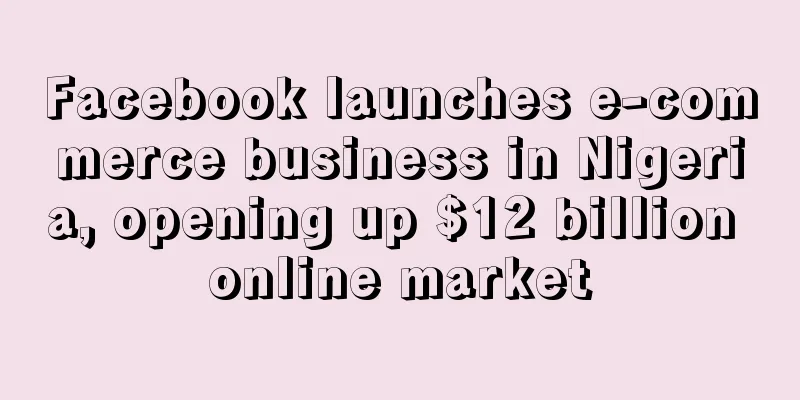Facebook launches e-commerce business in Nigeria, opening up $12 billion online market

|
According to punchng, social media giant Facebook launched its Marketplace e-commerce service in Nigeria, a West African country, in early February this year to help local consumers search, buy and sell goods online on Facebook and filter by distance from the shipping location and product category.
Prior to this, Facebook has launched this e-commerce service in South Africa, Ethiopia and Kenya in Africa.
According to Wikipedia, Nigeria is the most populous country in Africa and the seventh most populous country in the world, with a population of over 195 million and an average age of 18. Thanks to the youthful population, Nigeria has 86 million Internet users, with an Internet penetration rate of 46% and is still rising. According to statistics, Nigeria's current e-commerce consumption is about US$12 billion, and it is expected that the country's e-commerce spending will increase significantly to US$75 billion by 2025. Therefore, the country has extremely high potential for e-commerce development.
Adaora Ikenze, director of public policy for English-speaking West Africa , said that the Marketplace e-commerce service launched by Facebook in Nigeria can help promote trade activities in the country and strengthen connections between and within different communities . And as more and more people begin to trade goods on Facebook , Marketplace is expected to become an online shopping mall that facilitates the lives of Nigerian residents.
When explaining how Marketplace works , Facebook said that after sellers list products on Marketplace, the products will be included in Facebook's public list and all Facebook users can see the product information list .
When uploading product information, sellers only need to take a photo of the product , enter the product name , product description , sales price and product shipping address , select and confirm the product category , and then publish it to Facebook's Marketplace . However, the items , products or services sold by sellers must comply with their community standards and business policies.
In order to maintain the development environment of its e-commerce market, Facebook also made the following suggestions to buyers and sellers who plan to use Marketplace:
1. When buying high-value items such as watches and high-end bags, it is best for buyers to ask the seller for an invoice or receipt that can prove the authenticity of the product and the purchase record;
2. It is best for buyers and sellers to meet in a public place and use cash, cash on delivery or person-to-person payment instead of using payment links; 3. Buyers and sellers should not share their financial account information, such as payment login names, bank account information, and passwords;
4. Buyers can refuse to purchase products if they are not satisfied with them or have doubts. Buyers also have the right to report sellers or products that violate relevant business policies. In the past two years , Facebook has been vigorously developing e-commerce businesses around the world. Interested sellers can also follow Facebook's footsteps to find new ways to expand overseas markets and increase online sales! Nigeria |
<<: The number of newborns in Japan in 2020 is only 870,000!
Recommend
What is simuolive? simuolive Review, Features
Simuolive's mission for skin care products and...
What is KYC Review? KYC Review, Features
KYC (Know Your Customer) is the examination and f...
Etsy is launching a Labor Day Sale!
Recently, Etsy is preparing to launch a holiday p...
eBay to offer protection to sellers affected by Royal Mail strike
According to foreign media reports, the Royal Mai...
Cross-border e-commerce was hotly discussed at the two sessions, and many universities added related majors
Affected by the global epidemic, consumer shoppin...
What is Owl Crown Supply Chain? Owl Crown Supply Chain Review, Features
Ouguan Supply Chain (Shenzhen Ouguan Supply Chain ...
Sales of nearly 10 billion yuan in half a year! This toy is so popular that it cannot be underestimated
Under the epidemic situation, big-name toys have ...
What is Leez? Leez Review, Features
Leez is a luxury department store featuring an ecl...
Last year, online shopping spending increased by 85% year-on-year, and e-commerce companies increased their investment to target the Turkish market
The report said that part of the reason is that c...
SHEIN plans to hold a charity music festival on May 2 and live broadcast it through the App
Recently, SHEIN announced that it will hold its s...
What is Triomega(トリオメガ)? Triomega(トリオメガ) Review, Features
Triomega (トリオメガ) is a service that supports Amazo...
Another Shenzhen freight forwarder "collapses"! The seller has sued
The freight forwarding industry has been in turmo...
South Korea's traditional low table "soban" may usher in a big boom
As of 00:00 on February 5, 2021 , South Korea had...
Busy preparing for 618, a large number of factories and merchants "all in" on AliExpress's super boom day
It is mid to late May, and it is time for the e-c...
More than 1,700 users received fraudulent text messages! Royal Mail urgently warns: Be careful of account information leakage
A scam is sweeping the UK and the Royal Mail has ...









